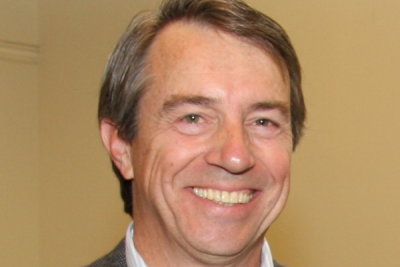
After 13 years serving as CEO of the Arthur W. Page Society, the premier professional society for chief communication officers internationally, Roger Bolton ‘72 (Journalism) is heading into retirement, but he’s not done.
“I’m not using that word,” said Bolton. “I’m done working full time. I’m done running something and dealing with administrative and personnel issues all day long. I’m ready to use my brain to figure out how businesses can be even more trusted as an institution that creates value, not just for customers and shareholders, but also for society at large.”
Before his role as CEO of the Page Society, Bolton worked as a journalist, in communications in the political arena and in corporate communications. He served as head speechwriter for Reagan during his reelection campaign, assistant U.S. trade representative for public affairs, special assistant to Reagan and then head of global media relations for IBM and vice president of communication at Aetna, in a career that positioned him as a top voice in the industry.
But before Bolton was a thought leader in communication, he was a kid who didn’t know what he wanted to do with his life.
“My grandfather was working for the engineering department in Ames, Iowa, and my dad was an engineer,” Bolton said. “I felt a family obligation to go to Iowa State University in Ames and study engineering.”
When that wasn’t going to plan, he started to find that his calling was elsewhere.
“I was terrible at it,” Bolton said. “And I was spending all of my time volunteering for the school newspaper.”
He recalls that when he finally told his dad he hated engineering and wanted to be a journalist, his dad was immediately supportive and told him to “be the greatest journalist ever.”
Bolton then transferred to The Ohio State University’s journalism program and quickly made his mark.
“By the time I left Ohio State, I was editor of The Lantern,” Bolton said. “What I learned in that program: how to understand complex issues, how to think critically and analytically about them, how to communicate the complexities of them in a way that people could understand them. That’s what journalism does. It’s an extremely powerful skill that translates into public affairs and strategic communication.”
After graduation he put that knowledge to good use working for the Marion Star for two years before moving to Washington, D.C. where he held various communication roles.
“It was just an amazing series of opportunities,” said Bolton. “From a junior staffer on the Hill to a senior staffer on the Hill, to the head of speechwriting and messaging for the Reagan and Bush reelection campaign in 1984.”
He also worked for Reagan in the White House as liaison to the business community, in the Treasury as assistant secretary of the treasury, and as assistant U.S trade representative for public affairs.
As assistant U.S. trade representative, Bolton was involved in the creation of what would eventually become the World Trade Organization.
“That work led to an opening up of trade around the world that, for the first time, allowed people in developing countries to have access to developed country markets in a way that over 20 or 30 years lifted 2.5 billion people out of poverty,” said Bolton.
After serving as assistant secretary of the treasury, Bolton shifted gears to the public sector to run global media relations at IBM and then he moved again to Aetna.
“I started at Aetna at a time when the hatred of health insurance companies was a huge public issue,” Bolton said.
When a new CEO restructured the company, Bolton was put in charge of cultural transformation. Together, the senior leadership spent six years reshaping the company.
“We had to get every single person in the company to think differently about who we are, what we did and how we worked.”
This change ensured that they could better help the public get access to the healthcare that they needed at reasonable prices without blocking people from getting the care that they needed and helped them to work with doctors more productively.
“In the process, the company actually went from losing money to making money and the value of the company went up 700%,” said Bolton. “The value piece still matters. It’s just not the only thing that matters.”
Back when Bolton was imagining what he wanted to do with his career, he didn’t have a solid answer.
“The only thing I could come up with was when I look back on my life from my deathbed, I want to be able to say that the world was just a tiny bit better because I was here,” Bolton said.
Article by student Paige Hollowell
